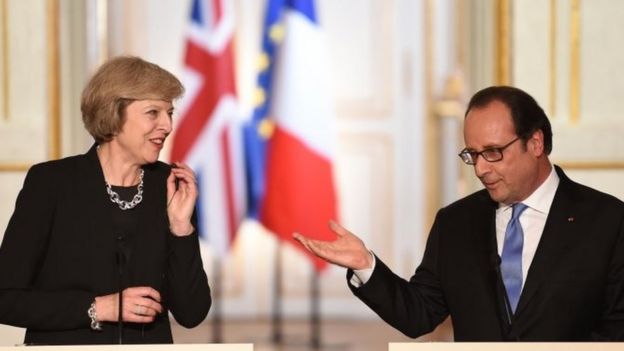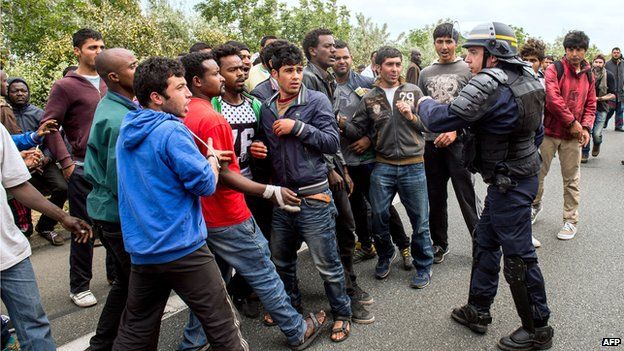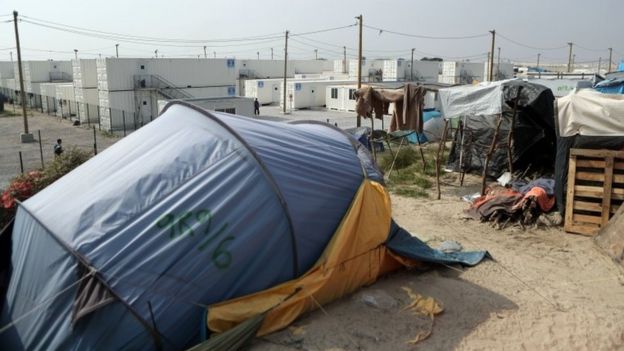
This article is more than
9 year oldXavier Bertrand said people living in the camp known as the Jungle should be able to apply at a "hotspot" in France rather than waiting to reach Britain.
UK officials currently check passports in France, stopping many from entering.
The Home Office said "those in need of protection should seek asylum in the first safe country they enter".
The Jungle camp has become the focal point of France's refugee crisis with up to 9,000 people living there.
Almost every night many try to circumvent passport checks by hiding inside vehicles entering the port and the Channel Tunnel to get to Britain.
Mr Bertrand hopes that amending the current agreement between France and the UK - called the Treaty of Le Touquet - would help alleviate those problems.
The treaty allows British immigration officials to check passports in Calais and their French counterparts to do the equivalent in Dover. Without it, UK officials would have to wait until people and vehicles arrived on British soil.
Mr Bertrand said under his plan anyone rejected by the UK would be deported directly to their country of origin.
But a Home Office spokesman said the UK government was "committed to working together to protect our shared border in Calais" and to maintain the current controls.

"The French government have repeatedly made it clear that removing the juxtaposed controls would not be in the interests of France," he added.
Home Secretary Amber Rudd is to meet her French counterpart Bernard Cazeneuve in Paris on Tuesday to discuss security issues.
Debate over border controls was a key issue in the EU referendum campaign with David Cameron claiming the Jungle could move to England if the UK left the EU.
But just weeks after the warning the then-PM and French President Francois Hollande agreed a "mutual commitment" to keep it in place. After the Brexit vote Theresa May and Mr Hollande reiterated the commitment.

Under EU rules, known as the Dublin Regulation, asylum seekers should claim asylum in the first safe country they come to.
British officials must also take responsibility for claims made elsewhere in the EU if the person can demonstrate they have close family members living legally in the UK.
Electronic fingerprinting means many who make it further into Europe will end up being sent back to Italy or Greece, where many first entered the EU.
UK politicians say under the Dublin rules, migrants in Calais should claim asylum in France if they need protection.
But many migrants say their life in France is "no good", and they hope for better opportunities in the UK.
Mr Bertrand does not have the power to change the treaty, but several of the candidates looking to win next year's French presidential election, including former French President Nicolas Sarkozy, support his idea that it be either reformed or annulled.
During a speech in Le Touquet this weekend Mr Sarkozy said: "Those who are here in Calais and who want to cross to England should be processed in England by the English."
The former president signed up to the treaty in 2003 as part of a deal to close a former migrant centre in Sangatte.
Sir Peter Ricketts, the former British ambassador to Paris, told BBC Radio 4's Today programme the proposals could make France more of a "magnet" for refugees trying to get to Britain.
He said hundreds of thousands of migrants were arriving in Greece and Italy, and nowhere near that amount were in Calais.
"As soon as you suggested that, there would be a huge magnet pulling thousands and thousands more migrants into Calais to chance their arm, make an asylum claim, hope that they might get to the UK and good luck.
"So it wouldn't help the French deal with the problem of thousands of people in Calais... I think it would make it worse, almost certainly."

Charlie Elphicke, Conservative MP for Dover, agreed the treaty needed to be revised but said axing it altogether "would be a disaster for France and Britain".
"It would simply force the ferries and Tunnel to become border guards - meaning higher ticket prices and longer queues," he said.
Former chief inspector of borders John Vine said Britain would need to be confident that proper checks would be carried out.
"If border controls were removed back to the UK, then of course there would be more reliance on the French authorities in actually checking that people have the right travel documents, checking all the vehicles in northern France in a way that's now done jointly and also done with lots of British money," he said.
Earlier this month, local councils in the UK said they should be involved in assessing the needs of child migrants in Calais before they arrive in the UK.
About 4,000 lone children are claiming asylum in the UK, with their care and resettlement down to local authorities.
The Local Government Association said earlier involvement would make it easier for councils to help children settle.